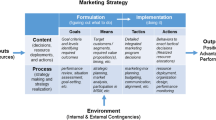Abstract
The extant marketing literature provides little guidance for theory development or practice with regard to questions of ethical conformity and the resulting market response. To begin to bridge this research gap, we advance a theoretical framework of ethical conformity in marketing, appealing to marketing ethics, management strategy, and sociological foundations. We set the stage for our theoretical arguments by considering the role of normative expectations related to marketing practices and behaviors held by societal constituents. Against this backdrop, we propose drivers of conformity in marketing, including practices consistent with both overconformity and underconformity. The framework allows us to advance testable research propositions by which questions of ethical conformity may be explored. We conclude by suggesting additional future research needed to develop the domain, specifically in the form of empirical inquiries uncovering firm strategic decisions with ethical implications.
Similar content being viewed by others
References
Albert D. A., S. Whetten 1985 Organizational Identity. In: L. L. Cummings, B. M. Staw (eds.), Research in Organizational Behavior, Vol. 7. JAI Press, Greenwich, CT, pp. 263–295
Albrecht K., L. McIntyre 2005, Spychips: How Major Corporations and Government Plan to Track Your Every Move with RFID. Nelson Current, Nashville, TN
Baum J. A. C., C. Oliver 1991 Institutional Linkages and Organizational Mortality. Administrative Science Quarterly 36(June), 187–219
Brewer L., R. Chandler, O. C. Ferrell 2006. Managing Risks for Corporate Integrity: How to Survive an Ethical Misconduct Disaster. Thomson, Mason, OH
Brown T. J., P. A. Dacin, M. G. Pratt, D. A. Whetten 2006 Identity, Intended Image, Construed Image, and Reputation: An Interdisciplinary Framework and Suggested Terminology. Journal of the Academy of Marketing Science 34(2), 99–106
Deephouse D. L. 1999 To Be Different, Or To Be the Same? It’s A Question (And Theory) of Strategic Balance. Strategic Management Journal 20(February), 147–166
DiMaggio P. J., W. W. Powell 1983 The Iron Cage Revisited: Institutional Isomorphism and Collective Rationality in Organizational Behavior. American Sociological Review 48(April), 147–160
Dunfee T. W., N. C. Smith, W. T. Ross Jr. 1999 Social Contracts and Marketing Ethics. Journal of Marketing 63(July), 14–32
Engardio P. 2007 Beyond the Green Corporation. Business Week January 29, 50–64
Ferrell, O. C.: 2007, ‹Nature and Scope of Marketing Ethics’, in W. Wilkie, G. T. Gundlach and L. Block (eds.), Explorations of Marketing in Society (Thomson-Southwestern, Ohio), 858–875
Gioia D. A., M. Schultz, K. G. Corley 2000 Organizational Identity, Image, and Adaptive Instability. Academy Management Review 25(January), 63–81
Grewal R., J. M. Comer, R. Mehta 2001 An Investigation into the Antecedents and Consequences of Organizational Participation in Business-to-Business Electronic Markets. Journal of Marketing 65(July), 17–33
Grewal R., R. Dharwadkar 2002 The Role of the Institutional Environment in Marketing Channels. Journal of Marketing 66(July), 82–97
Handelman J. M. 2006 Corporate Identity and the Societal Constituent. Journal of the Academy of Marketing Science 34(2), 107–114
Heckert D. M. 1998 Positive Deviance: A Classificatory Model. Free Inquiry in Creative Sociology 26, 23–30
Heckert A., D. M. Heckert 2002 A New Typology of Deviance: Integrating Normative and Reactivist Definitions of Deviance. Deviant Behavior 23, 449–479
Laczniak G. R., P. E. Murphy 2006 Marketing, Consumers, and Technology: Perspectives for Enhancing Ethical Transactions. Business Ethics Quarterly 16(July), 313–322
Merton R. K. 1938 Social Structure and Anomie. American Sociological Review 3, 672–682
Merton R. K. 1968 Social Theory and Social Structure. The Free Press, New York
Murphy P. E., G. R. Laczniak, N. E. Bowie, T. A. Klein 2005 Ethical Marketing: Basic Ethics in Action. Pearson Prentice Hall, Upper Saddle River, NJ
Pólos L, M. T. Hannan, G. R. Carroll 2002 Foundations of a Theory of Social Forms. Industrial and Corporate Change 11(1), 85–115
Selznick P. 1984 Leadership in Administration. Peterson, Evanston, IL
Simöes C, S. Dibb, R. P. Fisk 2005 Managing Corporate Identity: An Internal Perspective. Journal of the Academy of Marketing Science 33(Spring), 153–168
Smith N. C. 1993 Ethics and the Marketing Manager. In: N. C. Smith, J. A. Quelch (eds.), Ethics in Marketing. Richard D. Irwin, Homewood, IL, pp 1–34
Spreitzer G. M., S. Sonenshein 2004 Toward the Construct Definition of Positive Deviance. American Behavioral Scientist 47, 828–847
Suchman M. C. 1995 Managing Legitimacy: Strategic and Institutional Approaches. Academy of Management Review 20(July), 571–610
Taylor, C., P. Kaihla, C. Hawn, T. McNichol, M. Myser, S. Durst, M. Lev-Ram and M. V. Copeland: 2007, ‹Go Green. Get Rich’, Business 2.0 8(1), 68–77
Warren D. E. 2003 Constructive and Destructive Deviance in Organizations. Academy of Management Review 28(4), 622–632
Acknowledgement
The authors are grateful for the collective feedback of participants at the Excellence in Ethics Dissertation Proposal Competition sponsored by the Institute for Ethical Business Worldwide and the Mendoza College of Business at the University of Notre Dame. Special thanks are due to Patrick E. Murphy and Ann Tenbrunsel for their valuable comments and suggestions that have improved this paper.
Author information
Authors and Affiliations
Corresponding author
Additional information
Kelly D. Martin is Assistant Professor of Marketing at Colorado State University in Fort Collins, Colorado. Her research interests involve marketing strategy with ethical implications, interfirm relationships, the role of marketing in society, and the effects of institutions, social norms, and culture on organizations. Her work has appeared in the Academy of Management Journal, the Journal of Business Ethics, and Business & Society.
Jean L. Johnson is the Gardner O. Hart Professor of Marketing at Washington State University in Pullman, Washington. Her research focuses on marketing strategy, interfirm relationships, and capabilities and learning in firms. Her work appears in the Journal of Marketing, the Academy of Management Journal, and Journal of International Business Studies, among others.
Rights and permissions
About this article
Cite this article
Martin, K.D., Johnson, J.L. A Framework for Ethical Conformity in Marketing. J Bus Ethics 80, 103–109 (2008). https://doi.org/10.1007/s10551-007-9444-y
Published:
Issue Date:
DOI: https://doi.org/10.1007/s10551-007-9444-y




